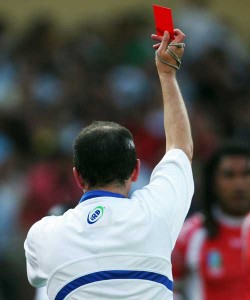SANZAR explains Judicial process
 The Judicial Rules for the Super Rugby and Tri Nations competitions are set out in IRB Regulation 17 as modified by SANZAR.
The Judicial Rules for the Super Rugby and Tri Nations competitions are set out in IRB Regulation 17 as modified by SANZAR.
In summary, a hearing will take place if a player is red-carded by the match referee, cited by the Citing Commissioner or receives three yellow cards in either the Super Rugby or Tri Nations competitions in any year. At the hearing a Judicial Officer will consider in detail all the evidence and submissions put forward by the player. This may include video evidence, evidence from the player or other players, evidence from the match officials, medical evidence and legal submissions.
Having considered all the evidence relating to the particular offending and the circumstances of the player charged, a Judicial Officer imposes, in every case, what it believes is a fair and proportionate penalty in accordance with the rules.
Set out below are some key facts relating to the Judicial process for the SANZAR Competitions:
1. Judicial Officers and Citing Commissioners
- Each of the three SANZAR Unions has a panel of Judicial Officers and Citing Commissioners. Judicial Officers must be legally qualified and experienced and Citing Commissioners must have appropriate rugby experience.
- For Tri Nations matches the Citing Commissioner and Judicial Officer are appointed from the neutral country (for example South Africa when the All Blacks are playing the Wallabies). To keep costs down, for Super Rugby matches the Citing Commissioner and Judicial Officer are appointed from the host country.
- A Citing Commissioner has, with limited exceptions, 12 hours from the end of the match to cite a player.
- The Citing Commissioner has the power to cite any player for an act of foul play which in the opinion of the Citing Commissioner warranted the player concerned being sent off. This is known as the red card test.
- Citing Commissioners act independently of the match officials; for example a player who receives a yellow card during the course of the match can still be cited if the Citing Commissioner believes the yellow card was an insufficient punishment and the offence met the red card test.
- Unions or teams cannot cite an opposing player, but may refer an incident to the Citing Commissioner for consideration within four hours of the conclusion of the match. The Citing Commissioner’s decision as to whether or not to cite a player is final.
2. The Judicial Hearing
- Hearings are held in private either the day after the match or, depending on the team’s travel schedules, a few days after the match.
- Players are entitled to legal representation and are provided with sufficient opportunity to consider the available evidence prior to the hearing.
- In the case of a red card, the Judicial Officer will consider the circumstances of the case and determine what further sanction, if any, should be imposed on the player. In the case of a citing, the Judicial Officer does not apply the red card test but he will review the case and determine whether, on the balance of probabilities, the player committed the act of foul play alleged. If the Judicial Officer finds the player did not commit the act of foul play alleged, the citing is not upheld and the player is cleared to play.
- A Judicial Officer will not make a finding contrary to a referee’s decision unless he is satisfied, on the balance of probabilities, the referee’s reasons for his decision are wrong
- In considering penalty, the Judicial Officer must decide if the nature of the offending is at the low, mid-range or high end of the scale of offences set out in IRB Regulation 17. That decision will determine the “entry point” in terms of the length of suspension which can then be increased or decreased according to the presence of aggravating or mitigating factors.
- Mitigating factors could include a player’s good record and character, the action taken to prevent the incident occurring again, an apology and remorse. Aggravating factors could include the player being classified as a persistent offender of the laws of the game, a lack of remorse or the need for a deterrent to combat a pattern of offending.
3. Appeal
- Players have the right of appeal to a SANZAR Appeal Committee comprising of one appointee from each the three SANZAR countries.
4. Review
- At the conclusion of each season, SANZAR undertakes a comprehensive review of the Super Rugby and Tri Nations tournaments during which all aspects of the judicial process are reviewed.
Related Posts
« Vaea banned one week for Ioane KO Crusaders lose McCaw again »
















